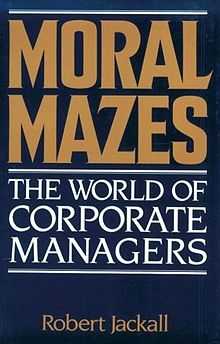Moral Mazes

Moral Mazes (ISBN 0-19-506080-6), named the "Most Outstanding Business and Management Book" of 1988 by the Association of American Publishers,[1] is a 1988 book from sociologist Robert Jackall that documents an investigation into the world of corporate managers in the United States. In the introduction, Jackall writes that he "went into these organizations to study how bureaucracy - the prevailing organizational form of our society - shapes moral consciousness" (Moral Mazes, page 2). He finishes the introduction by writing that the book is "an interpretive sociological account of how managers think the world works."
Based on several years of fieldwork conducting interviews with managers in several large corporations in the early 1980s, Jackall describes the social construction of reality within large corporations in America. Jackall argues that bureaucracy as implemented in the large American corporations he investigated "regularizes people's experiences of time and indeed routinizes their lives by engaging them on a daily basis in rational, socially approved, purposive action; it brings them into daily proximity with and subordination to authority, creating in the process upward-looking stances that have decisive social and psychological consequences; it places a premium on a functionally rational, pragmatic habit of mind that seeks specific goals; and it creates subtle measures of prestige and an elaborate status hierarchy that, in addition to fostering an intense competition for status, also makes the rules, procedures, social contexts, and protocol of an organization paramount psychological and behavioral guides." (Moral Mazes, page 4).
Jackall first starts with a history of American business specifically looking at changes in organizational structure during the creation of large corporations in the 19th century with the Industrial Revolution changing American industry. The changes in American industry indicated a need for a professional management class which in turn began to change the organizational culture of American business emphasizing rational decisions centered on money based measures such as profit and loss (see also rational choice theory).
Next Jackall describes the results of his interviews of managers at various levels of the organizations which allowed him to conduct his research. These organizations, not named, are large and medium sized companies. The qualitative data collected by the interviews covers approximately four years, beginning in 1980, documenting a number of changes in management within the corporations, a number of business decisions made, and the effect of those changes and decisions on the managers at various levels of the companies.
Perhaps the most important finding is that successful managers are dexterous symbol manipulators. Successful managers provide a public face and may be categorized as providing emotional labor as one of their major activities. They must be able to work well with others and to sublimate their emotional and psychological needs to the demands of others. The very ambiguity of their work and its assessment leads to the feeling on the part of the managers Jackall interviewed that "instead of ability, talent, and dedicated service to an organization, politics, adroit talk, luck, connections, and self-promotion are the real sorters of people into sheep and goats" (Moral Mazes, page 1).
See also
- Nickel and Dimed
- Parkinson's Law
- Peter Principle
References
- ↑ LibraryThing, Book awards: AAP Most Outstanding Business and Management Book. Accessed 2013-09-15.